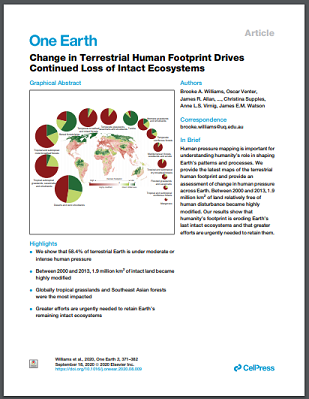
Human pressure mapping is important for understanding humanity’s role in shaping Earth’s patterns and processes. We provide the latest maps of the terrestrial human footprint and provide an assessment of change in human pressure across Earth. Between 2000 and 2013, 1.9 million km2 of land relatively free of human disturbance became highly modified. Our results show that humanity’s footprint is eroding Earth’s last intact ecosystems and that greater efforts are urgently needed to retain them.
Publication














